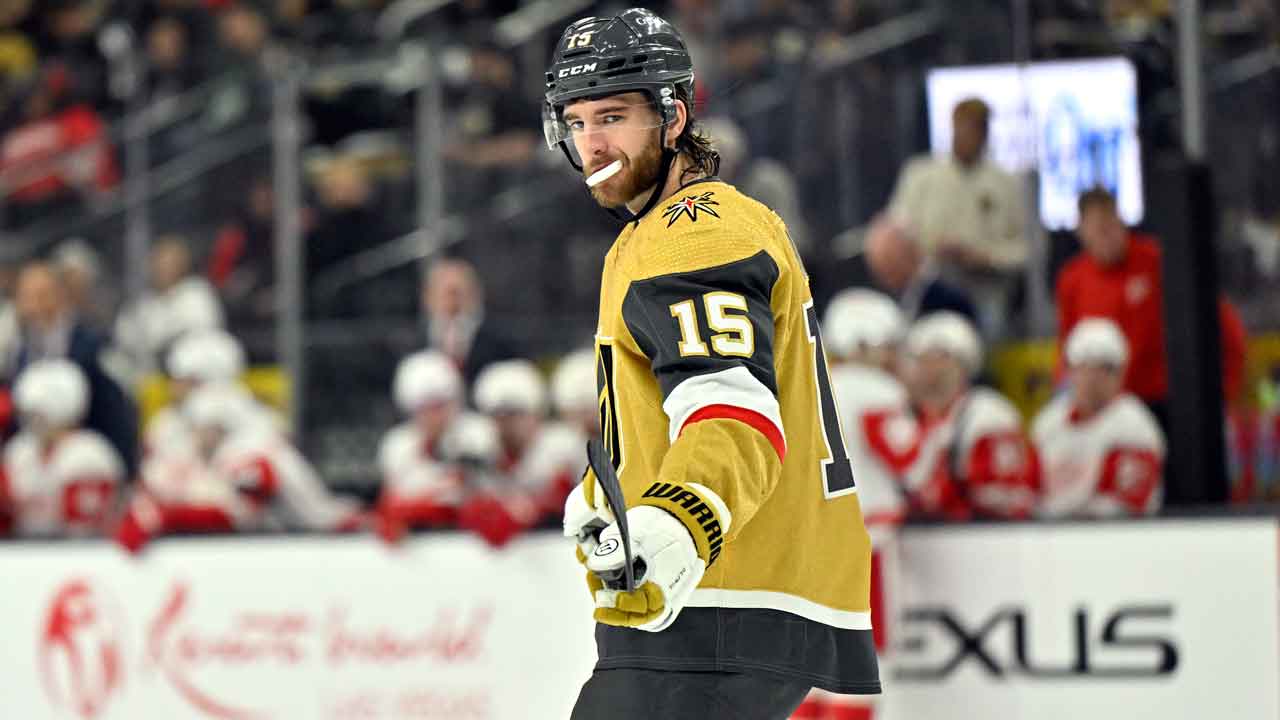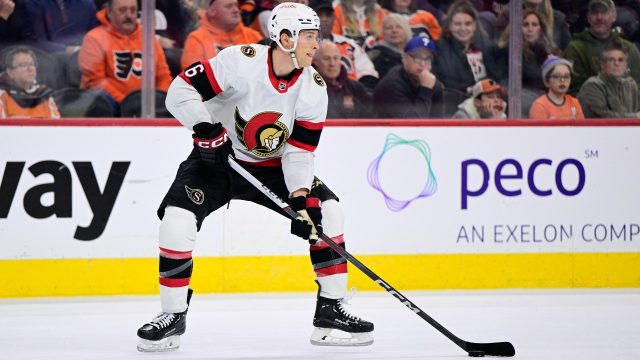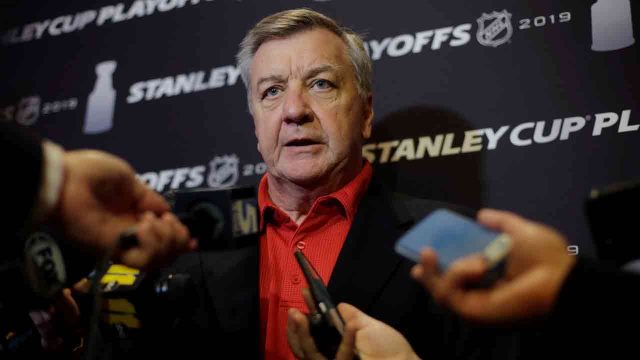
Trade season is officially underway in the NHL.
Even as the Stanley Cup Final moves to Edmonton for Game 6, silly season commenced in a big way for the other 30 teams not competing to lift Lord Stanley’s Cup and two big-name players — Pierre-Luc Dubois and Jacob Markstrom — will be reporting to a new city when training camp begins later this year.
With the cap rising by the most significant margin since before the pandemic, this year’s trade market is set to be much more active than in years’ past. But, before we embark on a wild off-season, now is a good time to reflect and look back on some of the trades we saw just a few months ago.
With the benefit of hindsight, let’s take a look at some of the 2023-24 trade deadline’s biggest deals and judge how well each panned out for the players and their new teams.
Elias Lindholm
Teams: Canucks from Flames
Grade: B
For the second year in a row, Jim Rutherford, Patrik Allvin and Co. jumped the market gun and made arguably the biggest move of the season two months out of the trade deadline.
On Jan. 31 with the Vancouver Canucks sitting first place in the Pacific Division, the club acquired Elias Lindholm from the Calgary Flames for a hefty return that included Andrei Kuzmenko, defence prospect Hunter Brzustewicz and a first-round pick.
At the time, it seemed like a win for both teams — Calgary received a proven goal scorer who perhaps just needed a change of scenery, in addition to picks and prospects, while Vancouver added an elite centreman to bolster offence heading into the playoffs.
In reality, though, Lindholm required quite a bit of runway to eventually reach his potential with the Canucks.
In 26 regular-season games with Vancouver, Lindholm had just six goals and six assists and was a minus-six. It came to a head when rumours began to circulate that the Canucks had considered flipping the forward ahead of the deadline to the Boston Bruins. Though the veracity of those rumours is debatable, it paints a picture of just how much Lindholm struggled out of the gate for the Canucks.
He was able to bounce back when it mattered most and after returning from a brief wrist injury, Lindholm became one of the top performers for the Canucks in the playoffs, with five goals and 10 points in 13 games — including the instant-classic Game 4 overtime winner to cap an improbable comeback in Round 1.
The Canucks caught a glimpse of the elite offence Lindholm can provide, but it may have been too little, too late. With virtually no hope that the Canucks will be able to sign the pending free agent before he hits the open market, Lindholm will likely go down as a pure rental.
Given the price it took to acquire him, the Canucks’ disappointing second-round exit, but his bounce-back post-season, Allvin and Rutherford earn a B on this trade.
Noah Hanifin
Teams: Golden Knights from Flames
Grade: A
If there is one thing that Kelly McCrimmon and the Vegas Golden Knights have proven since arriving in 2017, it’s that they should always be in the conversation — especially when it comes to big moves.
At the proverbial 11th hour of the Noah Hanifin sweepstakes, the Golden Knights swooped in and acquired one of the most coveted defencemen available, right out from under the Tampa Bay Lightning’s nose, for the price of Daniil Miromanov, a conditional first-round and conditional third-round pick.
Shortly before the end of the regular season, the Golden Knights locked up their newest acquisition with an eight-year, $58.8 million contract extension that will keep the 27-year-old in Vegas through the prime of his career.
Though the reigning Stanley Cup champs suffered an early playoff exit at the hands of the Dallas Stars, Hanifin had already earned the trust of the Golden Knights coaching staff. In the 19 games following his trade, Hanifin had two goals and 12 points and was awarded top power play time alongside Jack Eichel and Mark Stone.
In the post-season, Hanifin was a top points producer for the Golden Knights — his five points in seven games is tied for second-most on the team, behind only Eichel.
As tough as it may have been for the Golden Knights to stomach their first-round loss, it ironically made the Hanifin trade that much sweeter. Had the Golden Knights won a playoff series, the conditional third-rounder they sent away would have upgraded to a second.
His performance in the post-season isn’t necessarily what makes this trade so sweet for the Golden Knights — it’s the extension that comes with it. For a relatively affordable price, the Golden Knights and Hanifin will have eight more opportunities to make the deep playoff run they didn’t accomplish in 2024.
This front office has proven that lost draft capital isn’t as important as a promising young player, especially during a contending window, and that’s what they got in Hanifin. This deal may end up sweeter as time progresses, which is why McCrimmon gets an A.
Jake Guentzel
Teams: Hurricanes from Penguins
Grade: B+
Before resigning from his position, Carolina Hurricanes general manager Don Waddell swung for the fences in what seemed like the final window for this iteration of the team to push for a Stanley Cup.
Though the perennial contenders suffered a second-round exit for the fourth time in five years, it wasn’t because Waddell failed to bring in difference-making pieces.
After Lindholm left the market at the end of January, two-time Stanley Cup winner Jake Guentzel became the cream of the crop for top-six forwards available ahead of the trade deadline.
Guentzel was traded from Pittsburgh to the Hurricanes in exchange for Michael Bunting, two prospects, a conditional first-round pick and a conditional fifth-round pick. The haul sounds hefty, but dig a little deeper and consider Carolina’s post-season and it becomes clear that the Hurricanes gave up fewer assets than expected.
Performance-wise, Guentzel provided exactly what the Hurricanes needed playing alongside Sebastian Aho and Andrei Svechnikov, scoring at over a point-per-game clip in 17 regular-season appearances. In 11 playoff games, Guentzel helped the Hurricanes take the Rangers to six games after falling into a 3-0 series hole, scoring three of his four goals and five of his nine points in the second round.
Much like Lindholm, Guentzel isn’t likely to re-sign with the Hurricanes and, as of now, was a pure rental. Unlike Lindholm, however, Carolina did not have to expend much draft capital in the process.
Both of the draft picks sent to Pittsburgh were contingent on the Hurricanes making a deeper run in the playoffs. The first-round pick sent to the Penguins becomes a second-rounder given the Hurricanes did not advance to the Stanley Cup Final, and Carolina keeps their fifth-round pick because they did not win the Cup.
Though it does seem counter-intuitive to assign a high grade to a team that only made it halfway through the post-season, the Hurricanes were able to acquire an all-star winger who performed at an elite level throughout his time with the club for, in hindsight, pennies on the dollar.
For a rental on a team that did not make the Eastern Conference Final, Waddell kept the damage to their prospect pool and draft capital minimal. Had they advanced, the Hurricanes would gladly pay that price to get one step closer to the Stanley Cup. For that, this trade receives a B+.
Chris Tanev
Teams: Stars from Flames
Grade: A+
Alongside Hanifin, his teammate, Chris Tanev was one of the premier targets for many contenders looking to bolster their blue line.
The 14-year NHL veteran was on an expiring contract with the Flames and, as Calgary’s season continued to devolve, it became pretty clear that the two parties were headed toward a divorce.
Enter the Dallas Stars, who, on February 28, sent a prospect, a conditional second-round and conditional third-round pick to Calgary in exchange for Tanev.
Known as a defensive-minded defenceman who constantly puts his body on the line in service of his team, Tanev came exactly as advertised for the Stars. Coming off a year that saw him tied for third in shot blocks (207 over 75 games), Tanev added 73 more in the post-season over 19 games — averaging nearly four blocked shots per game. In 374:22 total time on ice through the post-season, Tanev allowed just 10 goals against and dished out 27 hits, per Natural Stat Trick. He finished his playoff run with a plus-seven rating.
The Stars lost in Game 6 of the Western Conference Final, but there’s no doubt that his defensive game and ability to log minutes — the intangibles, if you will — was instrumental in the Stars making their deep playoff run, making this trade an A+ for Jim Nill and the Stars.
What is interesting about Tanev compared to other pending UFAs that were dealt at the deadline is that there still exists optimism that he could return. The 34-year-old told Dallas media in the team’s exit interviews that he hopes to remain in Texas — even though he’ll likely have no shortage of suitors. If the Stars manage to keep Tanev in green, this trade may go down as one of the best deadline pickups for the Stars in recent history.
Tyler Toffoli
Teams: Jets from Devils
Grade: C
Not every trade can be a slam dunk.
When the Winnipeg Jets acquired Tyler Toffoli from the Devils in exchange for a second and third-round pick at the deadline, they were anticipating a deep playoff run and likely wanted the impressive playoff resume the winger provided — including a Stanley Cup win in 2014.
Toffoli had a respectable regular season with the Jets, appearing in 18 games following the trade and potted seven goals and 11 points as the Jets finished the season second in the Western Conference and fourth place in the league.
But the 32-year-old, much like the rest of the Jets roster, fell apart in the first round, dropping their series against the Colorado Avalanche in five games.
A two-time 30-goal scorer in his career, Toffoli managed just two goals and no assists and a minus-two rating in the post-season. For a team that had probable Vezina Trophy-winner Connor Hellebuyck, had traded for Sean Monahan earlier in the season and had a defence core regarded as one of the strongest in the NHL, winning just one playoff game is a disappointment.
Though general manager Kevin Cheveldayoff did manage to minimize the damage to their 2024 draft capital and, more or less, keep their 2025 picks in tact, Toffoli underperformed when the games mattered most and because of that, Cheveldayoff and the Jets receive a C.






